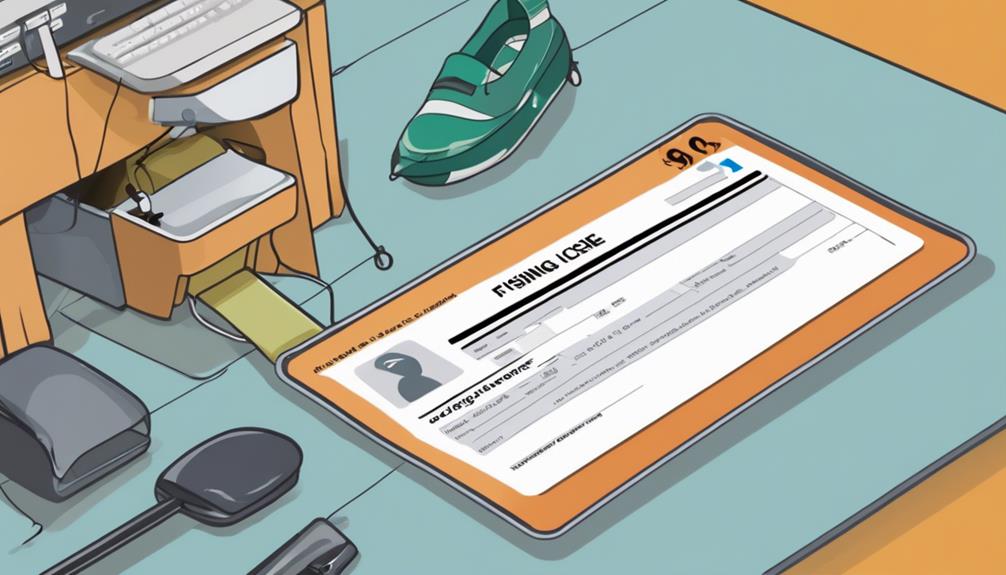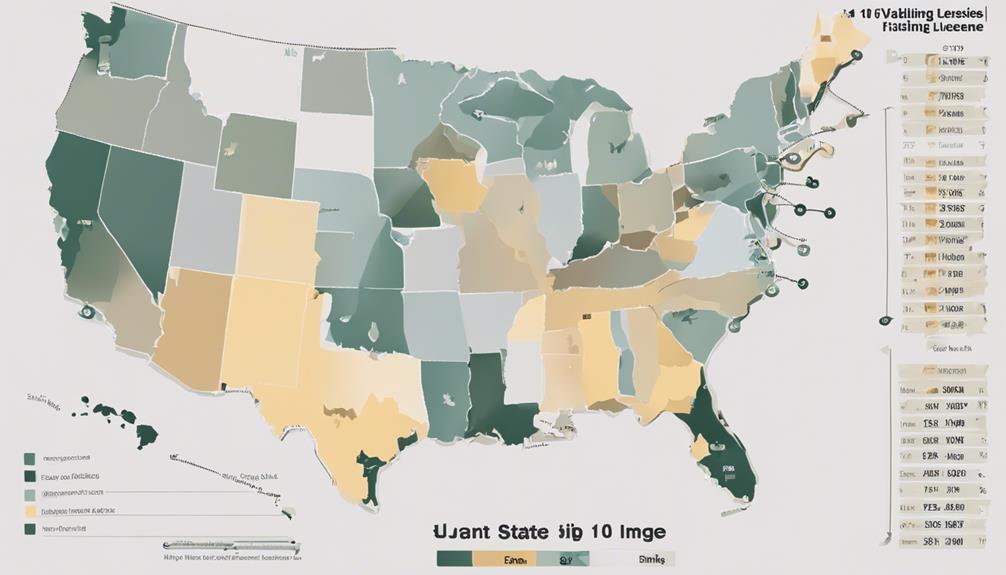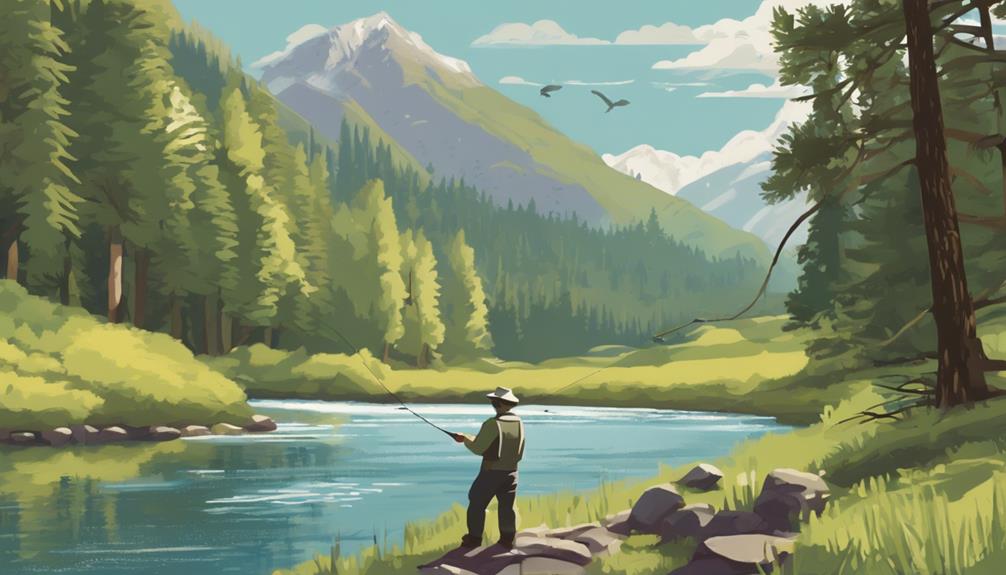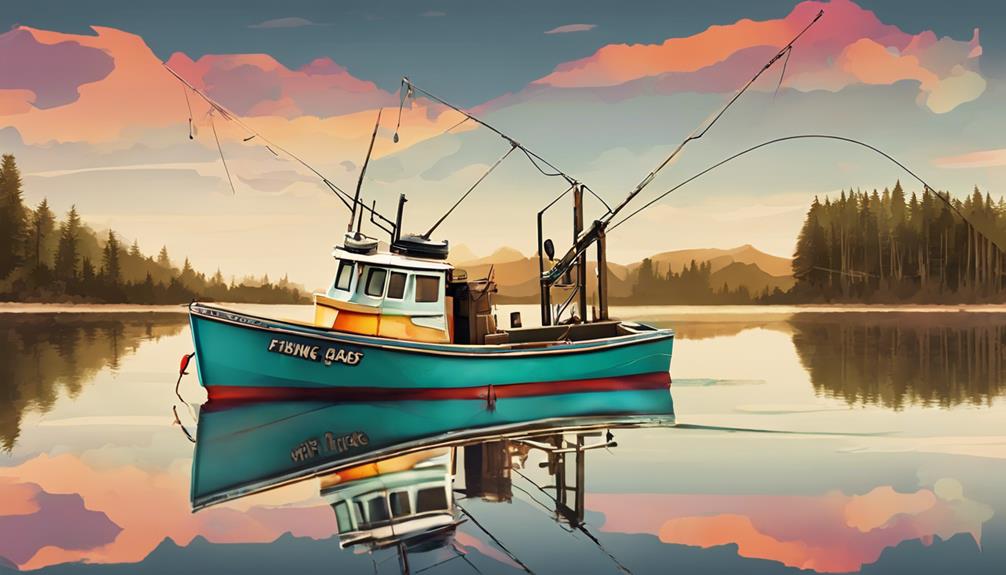To kick off the process of obtaining a fishing license, you may want to familiarize yourself with the necessary steps involved.
It starts with a simple check of your state's regulations, followed by selecting the appropriate license type.
But what comes next might surprise you.
Stay tuned to discover an essential element that could impact your fishing plans significantly.
Check State Regulations
Before you head out for a fishing trip, always check your state regulations to ensure compliance with the law. State requirements can vary significantly when it comes to fishing, including rules on fishing locations, allowed fishing methods, bag limits, size limits, and seasonal restrictions. Familiarizing yourself with these regulations is crucial to avoid any fines or penalties during your fishing excursions.
Different fishing locations within your state may have specific rules and guidelines that need to be followed. For example, certain bodies of water might have restrictions on the type of fish that can be caught or the hours during which fishing is permitted. By understanding these location-specific regulations, you can ensure that you're fishing legally and responsibly.
To find information on state requirements and fishing locations, you can visit your state's wildlife agency website or contact them directly. These resources typically provide detailed guides or handbooks that outline all the necessary regulations you need to know before heading out to fish. Additionally, many states offer online tools or interactive maps that can help you identify approved fishing areas and understand the specific rules that apply to each location.
Choose License Type
When deciding on the type of fishing license to obtain, consider the specific regulations and fishing activities you plan to engage in. The first aspect to contemplate is the license duration. Fishing licenses are typically available for different durations, such as daily, weekly, monthly, or annually. If you plan to fish regularly throughout the year, it might be more cost-effective to opt for an annual license. However, if you only fish occasionally, a daily or weekly license might be more suitable.
Age restrictions are another crucial factor to keep in mind. Some states have special regulations for minors, requiring them to obtain a junior fishing license. Make sure to check the age requirements in your state to ensure compliance with the law.
Additionally, consider if you'll need any special permits for the type of fishing you intend to do. Special permits may be necessary for activities like deep-sea fishing, freshwater fishing in certain areas, or fishing for specific species. Be aware of any additional permits required to avoid any penalties.
For non-residents, it's essential to be aware of the non-resident fees associated with obtaining a fishing license in a particular state. Non-resident fees are typically higher than resident fees, so factor this into your decision-making process when choosing the appropriate license type.
Gather Required Documents
To acquire your fishing license smoothly, ensure you have all the necessary documents ready for submission. Before starting the application process, it's crucial to have a document checklist prepared to streamline the process. The required documents may vary depending on your location, but there are some common items you should have on hand.
Typically, you'll need to provide a valid form of identification such as a driver's license or passport. This is essential to verify your identity and ensure that the license is issued to the correct person. Additionally, you may be required to show proof of residency in the state or country where you're applying for the fishing license. This can be in the form of a utility bill or a lease agreement.
Furthermore, you might need to provide information about your social security number for verification purposes. It's also advisable to have a credit or debit card ready to make the payment for the license application fee. Ensuring you have all these documents in order before starting the application process will help expedite the process and prevent any delays in acquiring your fishing license.
Visit Licensing Agency Website
Head over to the licensing agency's website to begin your fishing license application process. This is where you'll find all the necessary information regarding license eligibility and the application process. By visiting the official website, you can kickstart your journey to obtaining a fishing license hassle-free.
Here are three critical aspects to consider when you visit the licensing agency's website:
- License Eligibility: The website will outline the requirements you need to meet in order to be eligible for a fishing license. Understanding these criteria will help you determine if you qualify and what steps you need to take next. It's essential to ensure you meet all the necessary conditions before proceeding with your application.
- Application Process: The website will guide you through the application process step by step. You'll learn how to fill out the application form correctly and submit any required documents. Following the instructions provided on the website will make the application process smooth and efficient.
- Additional Resources: The licensing agency's website may offer additional resources such as fishing regulations, conservation efforts, and tips for responsible fishing practices. Taking advantage of these resources can enhance your fishing experience and contribute to the sustainability of aquatic ecosystems.
Complete Online Application
Begin by accessing the online application portal on the licensing agency's website to initiate the process of completing your fishing license application. The application process is straightforward and user-friendly, designed to make obtaining your fishing license as convenient as possible. Once you have reached the online portal, you'll be guided through the necessary steps to provide the required information for your license.
To start the online submission, you'll need to fill in personal details such as your name, address, contact information, and possibly your social security number. Make sure to have any relevant identification documents handy to input accurate information. The application may also inquire about your fishing experience or any previous licenses held.
During the application process, it's crucial to double-check all information for accuracy before submitting. Any errors could cause delays in processing your fishing license. Once you have completed all sections of the online form, submit your application as directed on the website.
Completing the online application is a vital step in obtaining your fishing license hassle-free. By following the guidelines and providing the necessary information accurately, you're one step closer to enjoying your time out on the water.
Pay License Fee
You can conveniently pay the required license fee online through the secure payment portal provided by the licensing agency. This step ensures that your fishing license is valid and up to date.
Here are a few key points to consider while paying your license fee:
- License Expiration: By promptly paying your license fee, you avoid the risk of fishing with an expired license. This helps you abide by fishing regulations and prevents any potential fines or penalties.
- Renewal Process: Paying your license fee online also familiarizes you with the renewal process. This can be a convenient way to ensure that you renew your fishing license on time in the future. By understanding the payment procedure now, you can streamline the process for subsequent renewals.
- Peace of Mind: Completing the payment for your fishing license gives you peace of mind knowing that you're compliant with the law. It allows you to focus on enjoying your fishing experience without worrying about the status of your license.
Receive Confirmation Email

Upon successful payment of your fishing license fee online, an automated confirmation email will be sent to the email address provided during the transaction. It's essential to adhere to proper email etiquette when receiving this confirmation. Check your inbox shortly after making the payment to ensure the confirmation email has been received. If you don't see it in your main inbox, remember to also check your spam or junk folder. Sometimes, automated emails can be filtered into these folders by your email provider's spam filters.
In the confirmation email, you'll find important details such as your fishing license number, the duration of validity, and any additional rules or regulations that may apply. It's a good practice to keep this email stored safely in your inbox or a designated folder for future reference. Moreover, in case you need to show proof of holding a valid fishing license, you can easily access this information.
Remember that email etiquette extends to all forms of communication, including automated messages like confirmation emails. Be sure to read the email carefully and follow any instructions provided within it. By staying organized and maintaining a tidy inbox, you can ensure that important emails like your fishing license confirmation aren't overlooked or lost in the shuffle.
Print Your Fishing License
When ready, print your fishing license for immediate use. After receiving the confirmation email, you're now just a step away from hitting the waters. Printing your fishing license is a simple process that ensures you're compliant with regulations and ready to enjoy your fishing expedition.
Here are three things to consider when printing your fishing license:
- License expiration: Check the expiration date on your fishing license before printing it. Make sure you have ample time to enjoy your fishing adventures without worrying about the license expiring soon. Renew your license promptly to continue fishing legally.
- Digital download: Keep a digital copy of your fishing license on your phone or other devices. This serves as a backup in case you misplace the printed copy. Having a digital download can also be convenient when you want to show your license to authorities without carrying a physical copy.
- Print quality: When printing your fishing license, ensure that the text and barcode are clear and legible. A high-quality printout will prevent any issues when officials scan or check your license. Double-check that all the information is correct before heading out to fish.
Frequently Asked Questions
Can I Purchase a Fishing License as a Gift for Someone Else?
Yes, you can purchase a fishing license as a gift for someone else. Gift options for fishing licenses are available, allowing you to surprise your loved ones with a fun outdoor activity.
Keep in mind the licensing requirements may vary depending on the location and type of fishing desired.
It's a thoughtful present that can lead to memorable fishing adventures for the recipient.
Are There Any Discounts or Special Rates Available for Seniors or Veterans When Purchasing a Fishing License?
Yes, there are discounts available for seniors and special rates for veterans when purchasing a fishing license.
Senior discounts and veteran rates can help you save money while enjoying your favorite pastime.
Don't forget to inquire about these offers when obtaining your license.
It's a great way to show appreciation for those who've served and to make fishing more accessible to everyone.
What Should I Do if I Lose My Fishing License or It Gets Damaged?
If you lose or damage your fishing license, don't worry!
You can easily replace it by reporting the issue and renewing it through online options.
If you encounter any problems, customer service is there to assist you.
Just follow the necessary steps to get your new license quickly and get back out on the water.
Can I Use My Fishing License in Multiple States or Do I Need to Purchase a Separate License for Each State?
Yes, typically each state requires its own fishing license. License reciprocity isn't common, so you usually need a separate permit for each state you fish in. State regulations govern fishing permits, and cross state validity isn't widespread.
Always check the specific rules for the states you plan to fish in to avoid any legal issues. Make sure you have the correct fishing license for each location you intend to fish.
Are There Any Restrictions on Where I Can Fish With My License, Such as Certain Protected Areas or Private Lakes?
You can fish with your license in many areas, but there are restrictions. Some conservation areas may require special permits or have specific rules.
Private lakes might also have their own regulations, so it's important to check before casting your line. Make sure to respect these guidelines to preserve the environment and maintain good relationships with landowners.
Always research the rules of the specific location you plan to fish in to avoid any issues.
Conclusion
Now that you've followed these 3 simple steps to acquiring a fishing license, you're ready to hit the water and start fishing!
Remember to always check state regulations, choose the right license type, and gather the required documents.
By completing the online application, paying the fee, and printing your license, you'll be all set for your next fishing adventure.
Happy fishing!



